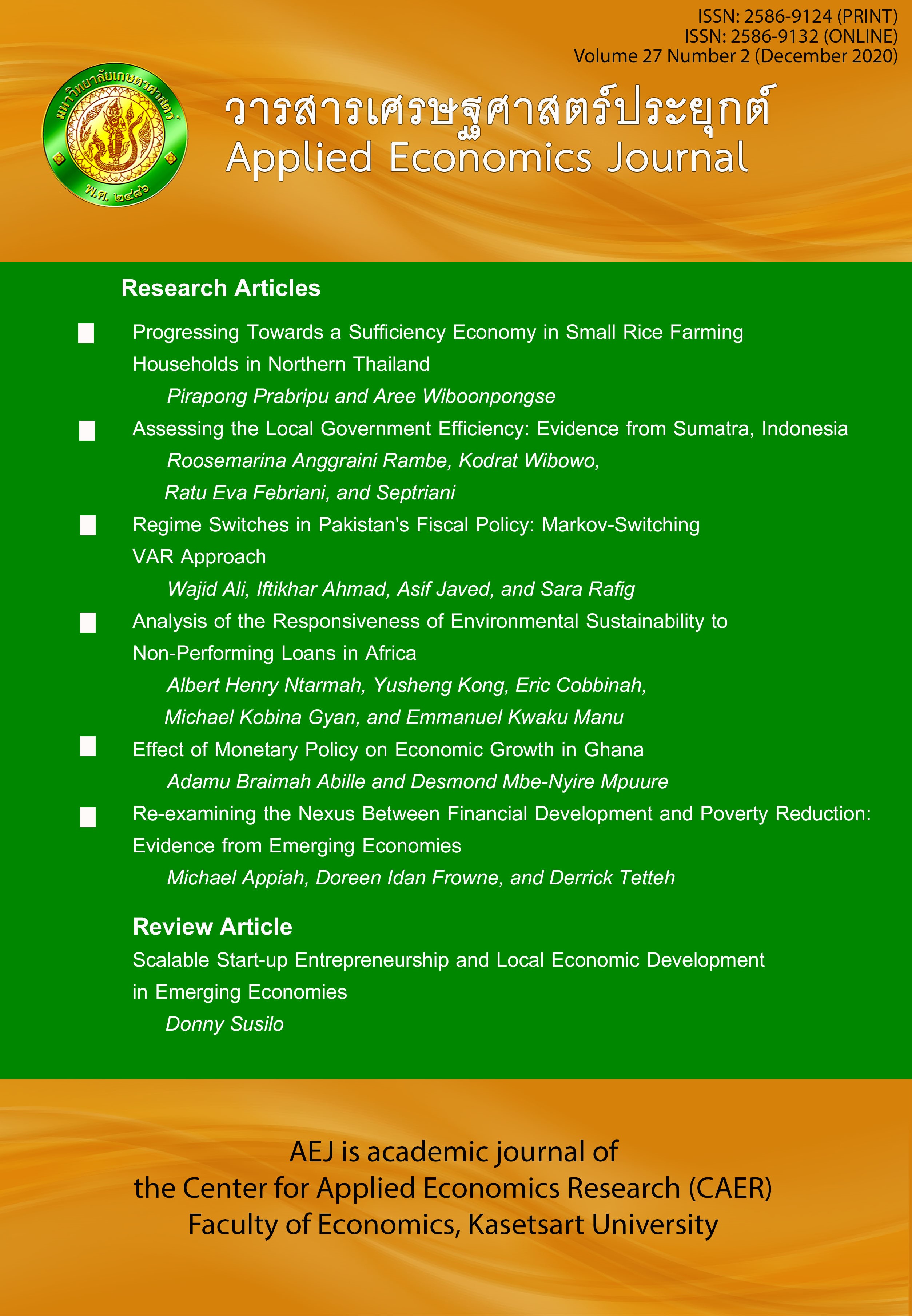Progressing Towards a Sufficiency Economy in Small Rice Farming Households in Northern Thailand
Main Article Content
Abstract
This study’s purposes are to evaluate and search for ways to progress towards a Sufficiency Economy (SE) in small farming households. The data were taken from farmer self-evaluations by assigning scores to their practices and activities to reflect whether and how far they follow the concept of a sufficiency economy, in both the production and the personal life domains. A total of 447 samples of small rice-based farming households in Chiang Mai Province covered in this study are categorized into those pursuing three different production systems. The investigation reveals that the households in the alternative farming system have a higher degree of a SE than those in the conventional and the subsistence farming systems which are almost at the same SE level. From the ordered logit regression, nine factors were identified as being able to contribute to the higher level of farming households in practicing according to the Sufficiency Economy Philosophy (SEP) including; 1) more than 12 years of educational attainment, 2) farming in the irrigated area which enables the farmers to have adequate water for agricultural production and involve a diversity of farming activities and systems, which in turn leads to the next factor, 3) taking up a wide range of economic activities, 4) household savings, 5) positive attitude toward a rice farming career, 6) willingness and sharing which includes being satisfied with the external environments comprising the next three factors, 7) good social surroundings, 8) access to financial sources, and 9) availability of good public infrastructure. The presence of all of these nine factors will make the farmers ready to learn and practice the principles of SEP more intensively.
Article Details
The paper is published under CC BY-NC-ND, in which the article is freely downloaded and shared in its original form non-commercially and its citation details are identified.
References
Chantarat, S., Attavanich, W., & Sa-ngimnet, B. (2018). Micro Thai farmers through farmer registration database: Focus on Thai farming structure change from the past to present. (In Thai) Retrieved from https://www.pier.or.th/wp-content/uploads/2018/05/aBRIDGEd_2018_009.pdf
Greene, W. H. (2012). Econometric analysis (7th ed.). Boston: Pearson Education.
Greene, W. H. & Hensher, D. A. (2009). Modeling ordered choices: A Primer. Cambridge: Cambridge University Press.
Janmaimool, P. & Denpaiboon, C. (2016). Rural villagers’ quality of life improvement by economic self-reliance practices and trust in the philosophy of sufficiency economy. Societies, 6(3), 1-20.
Leerattanakorn, N. (2015). Analysis of farmers’ happiness under levels of sufficiency economy (Unpublished doctoral dissertation). Chiang Mai University, Chiang Mai, Thailand.
Leerattanakorn, N. & Wiboonpongse, A. (2015). Sufficiency economy philosophy and the happiness of farmers on Thai way. The Empirical Econometrics and Quantitative Economics Letters, 4(2), 31-46.
Maddala, G. S. (1983). Limited-dependent and qualitative variables in econometrics. Cambridge: Cambridge University Press.
Ministry of Foreign Affairs. (2017). News and articles on Thailand’s progress in fostering global partnership for development through Sufficiency Economy Philosophy (SEP) for Sustainable Development Goals (SDGs). Retrieved from http://www.mfa.go.th/sep4sdgs/en/articles/70267-SEP-for-SDG-News-and-Articles.html
Mongsawad, P. (2010). The philosophy sufficiency economy: A contribution to the theory of development. Asia-Pacific Journal of Rural Development, 17(1), 123-143.
National Economic and Social Development Board (NESDB). (2003). Literature review related to sufficiency economy philosophy. Bangkok: NESDB. (In Thai)
National Economic and Social Development Board (NESDB). (2007). The philosophy of sufficiency economy. Bangkok: the 21 Century Printing House. (In Thai)
National Economic and Social Development Board (NESDB). (2018). The national strategy for 2018-2037. (In Thai) Retrieved from http://www.ratchakitcha.soc.go.th/DATA/PDF/2561/A/082/T_0001.PDF
Office of Agricultural Economics (OAE). (2018). Agricultural production statistics. (In Thai) Retrieved from http://www.oae.go.th/assets/portals/1/fileups/prcaidata/files/ครัวเรือนผู้ปลูกข้าวนาปี60(1).pdf
Office of the Royal Development Projects Board. (2011). The Sufficiency Economy Philosophy Contest. Bangkok: Arun Printing Ltd. (In Thai)
Phrabaidega Supot Tabaselo. (2017). An assessment for measuring a sufficiency economy levels of the improvement in Thai performance of Buddhist temples in Ubonratchathani Yasothorn Amnatcharoen Mukdahan and Nakhonphanom provinces. Bangkok: Sustainable Development Foundation. (In Thai)
Piboolsravut, P. (2000). An introductory note: Sufficiency economy. Excerpt partly from the conference statement of the 10th UNCTAD, Bangkok.
Piboolsravut, P. (2004). Sufficiency economy. ASEAN Economic Bulletin, 21(1), 127-134.
Puntasen, A. (2001). Buddhist economics: Evolution, theories and its application to various economic subjects. Bangkok: Amarin Press.
Puntasen, A. (2017). Sustainable from the benefits of sufficiency economy: A decade and a half of research to drive the sufficiency economy (2004-2016). Bangkok: Thailand Research Fund. (In Thai)
Puntasen, A., Premchuen, S. & Keitdejpunya, P. (2003). Application of the royal thought about the sufficiency economy in SMEs. Bangkok: Thailand Research Fund. (In Thai)
Somyana, W., Nonthakod, P. & Khamjai, K. (2018). Application of sufficiency economy in local administrative organization for community development: A case study in the North. Bangkok: Thailand Research Fund. (In Thai)
The Chaipattana Foundation. (2018). Sufficiency economy. Retrieved from http://www.chaipat.or.th/publication/publish-document/sufficiency-economy.html.
Thongpakdee, N. (2011). Sufficiency economy philosophy and the Thai society. Bangkok: Sufficiency Economy Study Center, The National Institute of the Development Administration.
Ubonsri, B. & Pannun, A. (2013). A study of applying sufficiency economy to lifestyles and use of resources at community levels. Procedia Environmental Sciences, 17(2013), 976-983.
Utsahajit, V. (2014). Sufficiency economy and human resource development. Bangkok: School of Human Resources Development, National Institute of Development Administration. (In Thai)
Wannarat, W. (2016). Test score and grading. Journal of Humanities and Social Sciences Rajapruek University, 2(3), 1-11. (In Thai)
Wasi, P. (1999). Sufficiency economy and civil society guidelines, ways to revive the economy and society. Bangkok: Folk Doctor Foundation. (In Thai)
Wiboonpongse, A., Sriboonchitta, S., Teerakul, N., Keanmanee, K. & Prabripu, P. (2009). The research-development project on agriculture and community enterprise system based on the sufficiency economy philosophy. (In Thai) Retrieved from https://elibrary.trf.or.th/project_content.asp?PJID=RDG4940006


